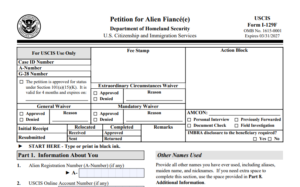Effective December 12, 2022, the U.S. Citizenship and Immigration Services (“USCIS”) updated the USCIS Policy Manual to allow it to automatically extend the validity of Permanent Resident Cards (commonly called “Green Cards”) for lawful permanent residents who have applied for naturalization to become U.S. citizens.
This update is expected to help naturalization applicants who experience longer processing times because they will receive an extension of their lawful permanent resident (“LPR”) Green Cards and may not need to file Form I-90, Application to Replace Permanent Resident Card (the Green Card). LPRs who properly file Form N-400, Application for Naturalization, may receive this extension even if they did not file Form I-90.
USCIS will update the language on Form N-400 receipt notices to extend Green Cards for up to 24 months for these applicants. The receipt notice can be presented with the expired Green Card as evidence of continued status, identity and employment authorization under List A of Employment Eligibility Verification Form I-9.
Prior to this change, under USCIS policy, naturalization applicants who did not apply for naturalization at least six months before their Green Card expiration date needed to file Form I-90 to maintain proper documentation of their lawful status. Applicants who applied for naturalization at least six months prior to their Green Card expiration were eligible to receive an Alien Documentation, Identification, and Telecommunications (“ADIT”) stamp in their passport, which served as temporary evidence of their LPR status.
This policy update recognizes USCIS’ current long processing times, while improving flexibility and efficiency by reducing the number of ADIT stamp appointments in field offices and the number of Form I-90s filed.
The extension will apply to all applicants who file Form N-400 on or after December 12, 2022. LPRs who filed for naturalization prior to December 12th will not receive a Form N-400 receipt notice with the extension. If their Green Card expires, they generally must still file Form I-90 or receive an ADIT stamp in their passport in order to maintain valid evidence of their lawful permanent resident status.
Lawful permanent residents who lose their Green Card generally must also still file Form I-90, even if they have applied for naturalization and received the automatic extension under this updated policy. This is because noncitizens must always carry with them proof of their status, such as the Green Card. Applicants who require an ADIT stamp may request an appointment at a USCIS Field Office by contacting the USCIS Contact Center.
If you have questions about U.S. visas and immigration contact us at info@enterlinepartners.com and speak with a U.S. immigration attorney in Ho Chi Minh City, Manila and Taipei.
ENTERLINE & PARTNERS CONSULTING
Ho Chi Minh City, Vietnam Office
Suite 601, 6th Floor, Saigon Tower
29 Le Duan Street
Ben Nghe Ward, District 1
Ho Chi Minh City, Vietnam
Tel: +84 933 301 488
Email: info@enterlinepartners.com
Facebook: Enterline & Partners – Dịch vụ Thị thực và Định cư Hoa Kỳ
Website: http://enterlinepartners.com
Manila, Philippines Office
Tel: +63 917 543 7926
Email: info@enterlinepartners.com
Facebook: Enterline and Partners Philippines
Website: https://enterlinepartners.com/language/en/welcome/
Copyright 2022. This article is for information purposes only and does not constitute legal advice. This article may be changed with or without notice. The opinions expressed in this article are those of Enterline and Partners only.








